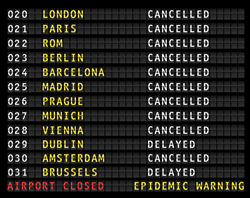
Behind a narcissist’s sense of grandiosity is a fragile and sensitive ego.
Narcissists are desperate to keep up their façade of superiority, because they don’t want to face the fact that deep down, they feel empty.
MONTREAL (PRWEB)
September 29, 2020
Narcissists’ confidence may seem unbreakable, but behind the arrogant bluff and know-it-all attitude lies a deep-seated vulnerability, according to a study conducted by PsychTests. In spite of their bluster and bravado, narcissists are petrified of having their weaknesses exposed, including their lack of self-love, their fear of rejection, and their hyper-sensitivity to criticism.
Analyzing data from 13,999 people who took the Self-Esteem Test, PsychTests’ researchers compared the attitudes, feelings, and behaviors of narcissists to non-narcissists. Here’s what they uncovered:
NARCISSISTS FEARS:
> 21% of narcissists are afraid of disclosing their mistakes (compared to 10% of non-narcissists).
> 47% of narcissists are unwilling to admit when they are wrong (compared to 10% of non-narcissists).
> 32% of narcissists are afraid to be themselves, without hiding all their faults and vulnerabilities (compared to 16% of non-narcissists).
> 55% of narcissists are terrified of being rejected by the people they love (compared to 28% of non-narcissists).
> 60% of narcissists are afraid of losing – or never gaining – other people’s respect (compared to 21% of non-narcissists).
> 44% of narcissists are worried about not being able to accomplish a task perfectly, and being seen as flawed (compared to 12% of non-narcissists).
> 62% of narcissists are alarmed by the idea of not being commended for their accomplishments (not even one person in the non-narcissist group displayed this fear).
HOW NARCISSISTS REALLY FEEL ABOUT THEMSELVES, DEEP DOWN:
> 51% of narcissists are not proud of their accomplishments unless they receive someone else’s praise (compared to 25% of non-narcissists).
> 31% of narcissists often feel worthless and useless (compared to 24% of non-narcissists).
> 50% of narcissists will do anything to be accepted by others, even if it means changing their personality, opinions, or appearance (compared to 12% of non-narcissists).
> 46% of narcissists seek out constant validation from friends and family, and need to hear that they are loved (compared to 11% of non-narcissists).
> 75% of narcissists want to be liked by everyone they meet (compared to 5% of non-narcissists).
WHAT NARCISSISTS DO TO KEEP THEIR FRAGILE FACADE FROM CRACKING:
> 44% of narcissists will point out other people’s mistakes, no matter how minor, in order to feel better about themselves (compared to 7% of non-narcissists).
> 34% of narcissists will only listen to positive appraisals, and ignore negative feedback/criticism (compared to 5% of non-narcissists).
> 33% of narcissists will counter negative feedback by listing all of their good qualities (compared to 5% of non-narcissists).
> 57% of narcissists namedrop and bring up their accomplishments in conversations (compared to 1% of non-narcissists).
“Narcissists will go to great lengths to keep up appearances,” explains Dr. Jerabek, president of PsychTests. “You will often see this behavior in celebrities who display narcissistic tendencies: They dress to impress, undergo cosmetic surgery or do other extreme things to change their appearance. They constantly promote themselves on social media, do outlandish things to draw admiration and attention, and are dismissive of people who they think are beneath them. This satiates their ego for a little while, but it’s a vicious circle, because the ugly truth will come to the surface again: The belief that they are unworthy, unloved, and meaningless. Narcissists are desperate to keep up their façade of superiority, because they don’t want to face the fact that deep down, they feel empty. Some narcissists are really good at hiding their vulnerabilities, even to the point of delusion, but the mask will come off eventually, and they will be shown for who they really are: Fearful of rejection, sensitive, and severely lacking in self-love.”
“To counter their sense of vulnerability, narcissists tear down other people with constant jibes, pettiness, projection, and gas-lighting. They can wreak havoc in personal relationships and in the workplace, especially if they are in a managerial role. As leaders, they engage in territoriality, set impossible standards, and rule by fear. As employees, they are un-coachable and unwilling to admit their shortcomings. It’s important to also understand that narcissism falls on a spectrum – some people are full-blown, others just have some tendencies. However, whatever the case, they are difficult to collaborate with, to like, or to love. Some narcissists can be helped by undergoing therapy, but few seek help, and even if they do, they are quite resistant. The best defense against a narcissist is to learn to spot them. In order to protect your own sense of self, don’t internalize their assaults on your character, don’t engage in their mind games, and if you’re a manager, don’t let them get away with bullying or harassment.”
Want to assess your self-esteem? Check out our Self-Esteem Test at https://testyourself.psychtests.com/testid/3102
Professional users, such as HR managers, coaches, and therapists, can request a free demo for this or other assessments from ARCH Profile’s extensive battery: http://hrtests.archprofile.com/testdrive_gen_1
To learn more about psychological testing, download this free eBook: http://hrtests.archprofile.com/personality-tests-in-hr
About PsychTests AIM Inc.
PsychTests AIM Inc. originally appeared on the internet scene in 1996. Since its inception, it has become a pre-eminent provider of psychological assessment products and services to human resource personnel, therapists and coaches, academics, researchers and a host of other professionals around the world. PsychTests AIM Inc. staff is comprised of a dedicated team of psychologists, test developers, researchers, statisticians, writers, and artificial intelligence experts (see ARCHProfile.com).
Share article on social media or email:













